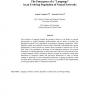Free Online Productivity Tools
i2Speak
i2Symbol
i2OCR
iTex2Img
iWeb2Print
iWeb2Shot
i2Type
iPdf2Split
iPdf2Merge
i2Bopomofo
i2Arabic
i2Style
i2Image
i2PDF
iLatex2Rtf
Sci2ools
CONNECTION
1998
1998
The Emergence of a 'Language' in an Evolving Population of Neural Networks
The evolution of language implies the parallel evolution of an ability to respond appropriately to signals (language understanding) and an ability to produce the appropriate signals in the appropriate circumstances (language production). When linguistic signals are produced to inform other individuals, individuals that respond appropriately to these signals may increase their reproductive chances but it is less clear what is the reproductive advantage for the languages producers. We present simulations in which populations of neural networks living in an environment evolve a simple language with an informative function. Signals are produced to help other individuals to categorize edible and poisonous mushrooms in order to decide whether to approach or avoid encountered mushrooms. Language production, while not under direct evolutionary pressure, evolves as a by-product of the independently evolving perceptual ability to categorize mushrooms.
| Added | 22 Dec 2010 |
| Updated | 22 Dec 2010 |
| Type | Journal |
| Year | 1998 |
| Where | CONNECTION |
| Authors | Angelo Cangelosi, Domenico Parisi |
Comments (0)

